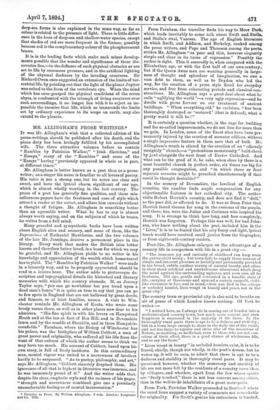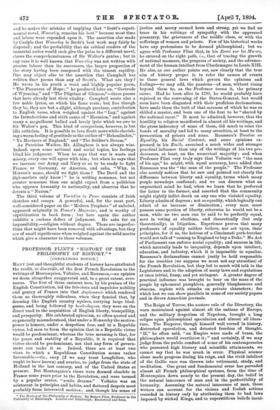MR. ALLINGHAM'S PROSE WRITINGS.* IT was Mr. Allingham's wish that
a collected edition of his prose-writings should be published after his death, and the pious duty has been lovingly fulfilled by his accomplished wife. The three attractive volumes before us contain "Rambles by Patricius Walker," "Irish Sketches," and "Essays," many of the " Rambles " and some of the "Essays" having "previously appeared in whole or in part, at different times."
Mr. Allinghain is better known as a poet than as a prose- writer; as a singer his name is familiar to all lovers of poetry. His voice is not a strong one, but its notes are clear and sweet, and have the lyrical charm significant of our age, which is almost wholly wanting in the last century. The prose of a poet has generally fine qualities, and these mis- cellaneous papers have the freshness and ease of style which attract a reader at the outset, and allure him onwards without a thought of fatigue. Mr. Allingham is something better than an agreeable writer. What he has to say is almost always worth saying, and on the subjects of which he treats, he writes from a full mind.
Many graceful and sympathetic books have been written about English sites and scenery, and some of them, like the Impressions of Nathaniel Hawthorne, and the two volumes of the late Mr. Jennings, deserve a permanent place in the library. Every work that makes the British isles better known and therefore better loved, is a boon for which we may be grateful, and Mr. Allingbara yields to no writer in his knowledge and appreciation of the wealth which home-travel has to yield. The "Rambles by Patricius Walker" were made in a leisurely way, and to be properly appreciated should be read in a leisure hour. The author adds to picturesque de- scription and topographical details the historical and literary memories with which the country abounds. If, as Jeremy Taylor says, "you can go nowhither but you tread upon a dead man's bones," it is quite as true to say that you can go to few spots in England that are not hallowed by great deeds, and famous, or at least familiar, names. A visit to Win- chester reminds Mr. Allingham of Keats, who wrote some lovely verses there, as well as in other places now dear to his admirers. "His fine spirit is with his lovers on Hampstead Heath and at the inn at foot of Box Hill, and in Devonshire lanes, and by the seaside at Shanklin, and in these Hampshire cornfields." Farnham, where the Bishop of Winchester has his palace, was the birthplace of William Cobbett, a man of great power and originality, who suffered all his life from the want of that culture of which the author seems to think we may have too much. His account of Cobbett, based upon his own story, is full of lively incidents. In this extraordinary man, mental vigour was united to a narrowness of intellect hardly to be surpassed. "As to poetry, philosophy, and art," says Mr. Allingham, " Cobbett sincerely despised them. His ignorance of all that is highest in literature was immense, and he was immensely proud of it." And the writer adds that, despite his clear, emphatic style and the raciness of his pages, "strength and narrowness combined give one a peculiarly uncomfortable feeling as of mental incarceration."
* Valieties in Prom By William Allingham. 3 yobs. London Longman and Co. 1393.
From Ferns ham, the traveller finds his way to Moor Park,
which leads inevitably to some talk about Swift and Stella, and Stella's rival, Vanessa. The age of English literature in which Swift, and Addison, and Berkeley, ranked among the prose writers, and Pope and Thomson among the poets, strikes Mr. Allingham "as poor and thin, however elegantly simple and clear in its turns of expression." Possibly the author is right. Thin it assuredly is, when compared with the Elizabethan age, or with the first half of our own century; but if the Queen Anne men are wanting generally in large- ness of thought and splendour of imagination, we owe a. vast debt to them, as well as to Dryden who led the way, for the creation of a prose style fitted for everyday service, and free from exhausting periods and classical con- structions. Mr. ,Allingham says a great deal about what he calls " uglifying the world "—a very ugly expression—and he dwells with pious fervour on our treatment of ancient buildings. "When everything old," he exclaims, "has been thoroughly destroyed or 'restored' (that is defaced), what a pretty world it will be !" • It is certainly a question whether, in the rage for building and for so-called improvements, we do not lose far more than we gain. In London, some of the finest sites have been per- manently injured by the erection of monster edifices, without a single impressive feature in them save that of bulk. Mr.
Allingham's wrath is stirred by the erection of an "odiously unsightly" church,—a "pretentious monstrosity" built cheek by jowl alongside the west front of Exeter Cathedral And what can be the good of it, he asks, when close by there is a.
most beautiful church in perfect order, six times too big for any possible congregation, and "in which three or four separate sermons might be preached simultaneously if that could be thought desirable?"
In the scenery of Devonshire, the loveliest of English counties, the rambler finds ample compensation for any objectionable features in her cathedral city. The author visits Robert Herrick's country, and does not find it "dull," as the poet did, or affected to do. It was at Dean Prior that Herrick found themes for song in the customs of the people, and there, too, were the Julias and Corinnas who inspired his song. It is strange to think how long, and now completely, Herrick was forgotten. Perhaps this was well, for had John- son, who knew nothing about the poet, included him in the "Lives," it is to be feared that his airy fancy and light, lyrical touch would have received small justice from the biographer, or from eighteenth-century readers.
Poet-like, Mr. Allingham enlarges on the advantages of a country life in comparison with life in a great city :—
" The immense joy and curiosity of childhood can keep oven the gutter-child merry ; but town fails to supply those sources of simple and innocent pleasure so lavishly and perennially provided in the broad, subtle, endless variety of natural beauty, and offers. in their stead artificial and unwholesome stimulants which drug the mind against the surrounding ugliness, and soon ruin all its freshness. Old age, gentle and contented in a humble state of life, carrying at threescore and upward a certain unspoilt, child- like sweetness in face and in mind,—this you find in the cottage or secluded hamlet, lives wrapt in beauty and peace, not in the great city."
The country town or provincial city is also said to breathe an_ air of peace of which London knows nothing. Of York he writes :— "I noticed here, as I always do in coming out of London into a, moderate-sized country town, how much more content and even happiness is expressed in the majority of the faces. In the thoroughly rural parts there is apt to be a dulness and stoli-iity ; but in a town large enough to share in the daily stir of the world, and not too large to repulse and drive afar off the amenities of Nature, so soothing, so medicinal, even to those who are not con- scious of their effect, there is a good chance of wholesome life, and so say the faces."
"Lives wrapt in beauty" in secluded hamlets exist, it is to be
feared, chiefly, though not wholly, in the poet's dream, but he wakes up, it will be seen, to admit that there is apt to be a dullness and stolidity in thoroughly rural parts. It may be questioned however, whether the monotony and sterility of
life are not more felt by the residents of a country town than by villagers, and whether, apart from the few whose spirits are "finely touched," there is not less content among either,. than in the well-to-do inhabitants of a great metropolis.
From York, Patricius Walker proceeded to Scotland, where the usual lions suggest a variety of comments not remarkable for originality. For Scott's genius his enthusiasm is limite&
and he makes the mistake of implying that "Scott's experi- mental novel, Waverley, remains his best" because most time and labour were expended upon it. The assertion also made by Carlyle that Waverley is Scott's best work may fairly be disputed ; and the probability that six critical readers of the immortal series would each give the palm to a different novel, shows the comprehensiveness of Sir Walter's genius ; but in any case it is well known that Firaver/ey was not written with greater labour than its successors, the larger proportion of the story having been composed with the utmost rapidity. One may object also to the assertion that Campbell has written finer poems than any of Scott's. What are they P He wrote in his youth a weak and highly popular poem, "The Pleasures of Hope ; " he produced later on, "Gertrude of Wyoming," and "The Pilgrims of Glencoe—three poems that have already lost their vitality. Campbell wrote also a few noble lyrics, on which his fame rests ; bat fine though they be, they are but a slight, although precious, contribution to English verse, when weighed against the "Lay," against the Introductions and sixth canto of " Marmion," and against many a magnificent ballad and lovely lyric which we owe to Sir Walter's pen. This kind of comparison, however, is but idle criticism. It is possible to love Scott more while cherish- ing a warmfeeling of gratitude to the author of" Hohenlinden," "Ye Mariners of England," and "The Soldier's Dream."
As Patricius Walker, Mr. Allingham is not always wise. Indeed, upon some national and social topics, his feelings blind his judgment. When he says that war is waste and misery, every one will agree with him; but when he says that we increase our Army and Navy so as to be ready to fight France, or Germany, or America, and asks, "Why, in Heaven's name, should we fight them ? The Devil and the diplomatists only know ! " he is writing nonsense, but not greater nonsense than one might expect from a politician who opposes humanity to nationality, and observes that he detests a "Nation."
The third volume of Varieties in Prose consists of Irish sketches and essays. A powerful, and, for the most part, well-considered paper on the "Modern Prophets" of unbelief, appeared originally in Fraser's Magazine, and is worthy of republication in book form ; but here again- the author exhibits a curious defect of judgment. He asks for an impossibility,—religion without dogma. These are imperfec- tions that might have been removed with advantage, but they are of small significance when weighed against the solid merits which give a character to these volumes.







































 Previous page
Previous page